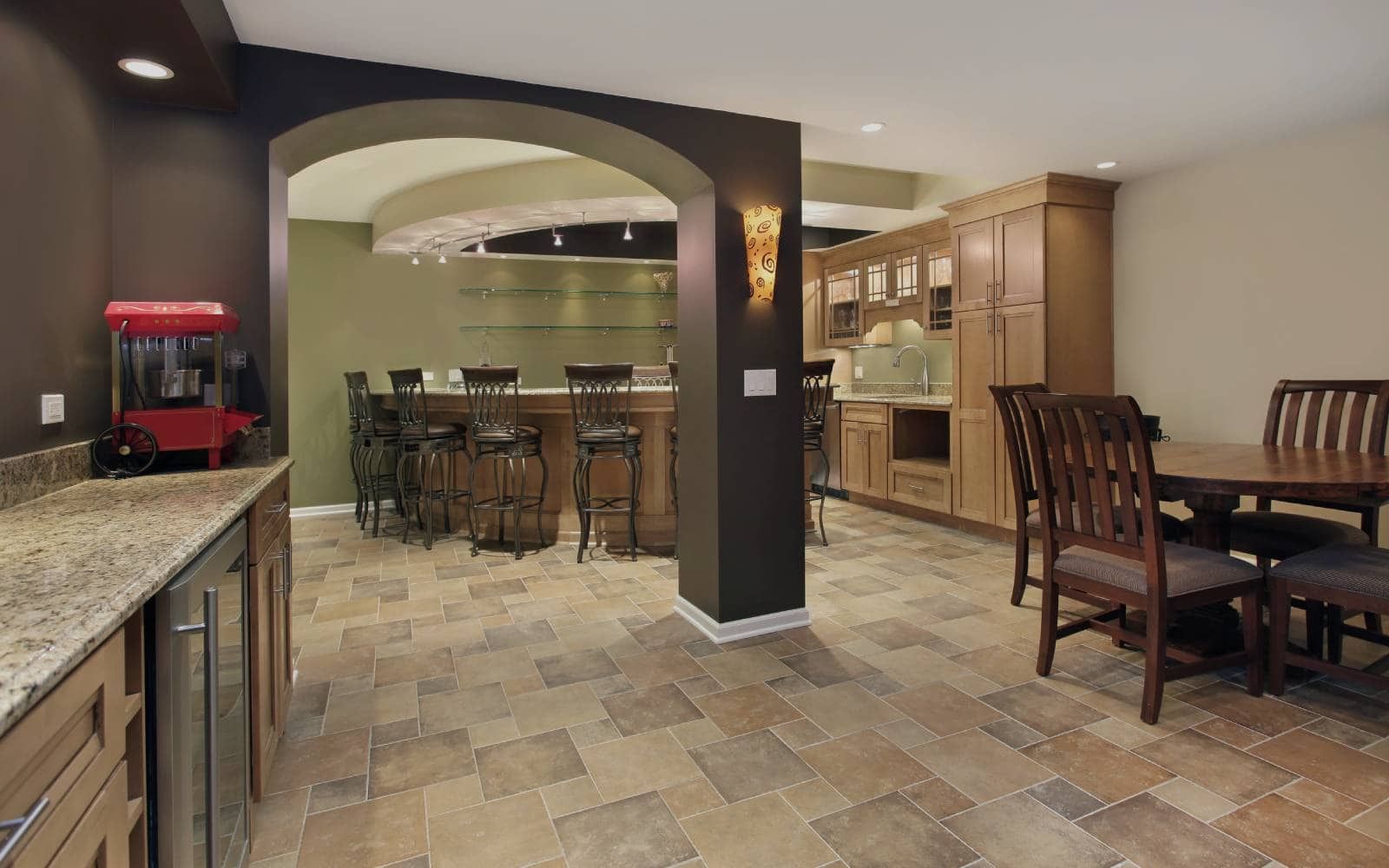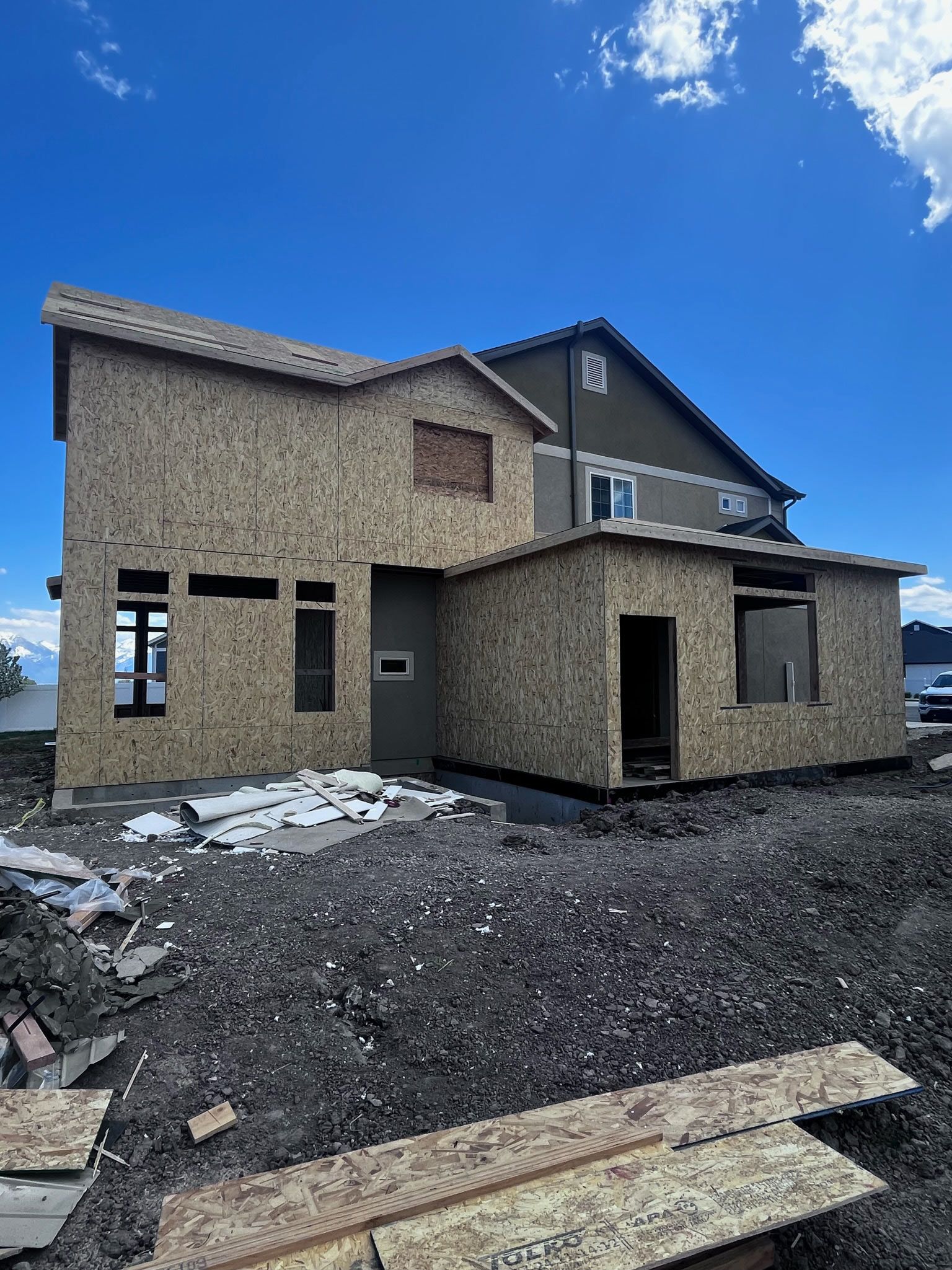Best Flooring Options for a Finished Basement (Pros & Cons)

Best Flooring Options for a Finished Basement (Pros & Cons)
Finishing a basement is a great way to add extra living space to your home, but choosing the right basement flooring can be tricky. Basements come with unique challenges like moisture, temperature changes, and durability concerns. Picking the wrong flooring can lead to warping, mold, or costly repairs down the road.
Some flooring options—like luxury vinyl plank (LVP), tile, and epoxy—work well in basements because they resist moisture and last longer. Others, like solid hardwood or standard carpet, can trap moisture and cause problems over time.
This guide breaks down the best basement flooring options, their pros and cons, and which materials work best for different basement uses. Whether you’re turning your basement into a living area, home gym, or entertainment space, you’ll find the right flooring solution here.
What to Consider When Choosing Basement Flooring?
Basements have different conditions than the rest of your home, so not all flooring materials work well in this space. Before choosing your basement flooring, consider these key factors:
Moisture Resistance
Basements are naturally damp. Water can seep in through concrete floors, pipes may leak, and humidity levels can rise. Choosing waterproof or moisture-resistant flooring helps prevent warping, mold, and mildew.
Durability
Your basement might get heavy foot traffic, especially if it’s used as a family room, playroom, or home gym. Durable flooring resists scratches, dents, and daily wear and tear, making it a smart long-term investment.
Insulation & Warmth
Basements tend to feel cold, especially in winter. Some flooring materials trap heat better than others, making the space more comfortable. If you don’t want a chilly floor, look for options with built-in insulation or pair your flooring with area rugs.
Maintenance & Lifespan
Not all flooring is easy to maintain. Some materials need regular sealing, while others only require occasional cleaning. Choose flooring that fits your lifestyle and won’t need constant upkeep.
Cost & Installation
Some basement flooring materials cost more upfront, while others may seem cheaper but require expensive installation or frequent repairs. Consider both material cost and labor fees before making a decision.
By keeping these factors in mind, you can choose the best flooring for your finished basement without running into unexpected issues.
Best Flooring Options for a Finished Basement (Pros & Cons)
Not all flooring works well in a basement. Some materials handle moisture and temperature changes better than others. Below are the best flooring options, along with their pros and cons to help you make the right choice.
Luxury Vinyl Plank (LVP) & Luxury Vinyl Tile (LVT)
Luxury vinyl is one of the best flooring choices for basements. It looks like real wood or stone, but it’s 100% waterproof and holds up well in damp environments.
✔ Pros:
- Waterproof – Won’t swell or warp from moisture
- Durable – Resists scratches and dents
- Low maintenance – Easy to clean with regular sweeping and mopping
- Affordable – Cheaper than hardwood or tile
- Easy installation – Many options have click-lock installation, great for DIY
❌ Cons:
- Can feel cold without an underlayment
- Some lower-quality vinyl can look less realistic than wood or stone
Best for: Basement living rooms, bedrooms, and playrooms where you want a warm, stylish look without moisture concerns.
Engineered Wood Flooring
Engineered wood gives your basement the classic look of hardwood but is more moisture-resistant than solid wood.
✔ Pros:
- More stable than hardwood in humid environments
- Looks like real hardwood
- Easy installation – Can be glued or clicked together
❌ Cons:
- Not fully waterproof – Can still warp with high moisture
- More expensive than vinyl
- Requires sealing to protect against moisture
Best for: Homeowners who want the look of hardwood but need better moisture resistance.
Tile Flooring (Porcelain & Ceramic)
Tile is one of the most waterproof flooring options, making it great for basements. It’s also very durable and easy to clean.
✔ Pros:
- 100% waterproof – Perfect for damp basements
- Durable – Resists scratches and wear
- Many design options – Mimics wood, stone, or concrete
❌ Cons:
- Cold underfoot – Needs radiant heating or area rugs for comfort
- Hard surface – Not ideal for playrooms or home gyms
- Can be expensive to install
Best for: Basement bathrooms, laundry rooms, and high-moisture areas.
Carpet (Low-Pile & Synthetic Fibers)
Carpet adds warmth and comfort to a basement, making it a good choice for living spaces or bedrooms. However, it’s not the best for moisture-prone areas.
✔ Pros:
- Soft and warm underfoot
- Provides insulation and reduces noise
- More affordable than hardwood or tile
❌ Cons:
- Absorbs moisture, leading to mold or mildew
- Harder to clean than other flooring types
- Needs regular maintenance to stay fresh
Best for: Basements that stay dry year-round and are used as living spaces.
Epoxy Flooring
Epoxy is a seamless, waterproof option often used in garages but also works well in basements.
✔ Pros:
- Waterproof and stain-resistant
- Durable – Withstands heavy foot traffic
- Low maintenance – Easy to clean
❌ Cons:
- Hard surface – Not comfortable for long periods
- Can be slippery when wet
- Requires professional installation for the best results
Best for: Basement workshops, laundry rooms, or industrial-style spaces.
Rubber Flooring
Rubber flooring is soft, impact-resistant, and great for home gyms or play areas.
✔ Pros:
- Shock-absorbing – Reduces impact on joints
- Water-resistant – Won’t be damaged by moisture
- Slip-resistant – Safe for kids and workout areas
❌ Cons:
- Has an industrial look that may not fit all basement styles
- Can show wear over time in high-traffic areas
Best for: Home gyms, playrooms, and workout spaces.
Polished Concrete
Polished concrete gives basements a modern, industrial look while being extremely durable.
✔ Pros:
- Waterproof and stain-resistant
- Very durable – Won’t chip or scratch easily
- Low maintenance – Easy to clean
❌ Cons:
- Cold and hard underfoot
- Can feel too industrial for some homes
- May need sealing to prevent stains
Best for: Modern or industrial-style basements that need a long-lasting, low-maintenance floor.
Flooring Options to Avoid in a Basement
Not all flooring materials work well in below-ground spaces. Some absorb moisture, while others warp over time. Avoid these options if you want a durable, low-maintenance basement floor.
Solid Hardwood
Why to avoid:
- Highly susceptible to moisture and humidity – Warps, swells, and cracks easily
- Requires constant maintenance – Needs sealing and refinishing to last
- Expensive – High cost upfront and even higher for repairs
Even with a vapor barrier and sealing, hardwood is too risky for basements.
Laminate Flooring
Why to avoid:
- Not fully waterproof – The core material absorbs water and swells
- Damage is permanent – Unlike vinyl, laminate can’t be repaired once it’s swollen
- Slippery when wet – Not ideal for damp environments
While some water-resistant laminates exist, they still don’t hold up as well as vinyl or tile in a basement setting.
Standard Carpet
Why to avoid:
- Traps moisture and leads to mold growth
- Hard to clean – Spills and dampness soak into fibers
- Short lifespan – Wears down quickly in high-traffic areas
If you prefer carpet, opt for low-pile synthetic fibers designed to resist moisture and mold.
What’s the Best Basement Flooring for Different Uses?
The best flooring for your finished basement depends on how you plan to use the space. Some options work better for high-moisture areas, while others are ideal for comfort and warmth.
Best for a Basement Living Room or Bedroom
🏆 Top Picks: Luxury Vinyl Plank (LVP) or Engineered Wood
✔ Looks like
real wood but resists moisture
✔ Feels
warm and comfortable underfoot
✔ Durable enough for
daily use
Avoid: Solid hardwood – It warps in humid conditions.
Best for a Basement Bathroom or Laundry Room
🏆 Top Picks: Porcelain Tile or Epoxy Flooring
✔
Waterproof – No risk of swelling or mold
✔
Easy to clean – Great for high-moisture areas
✔
Long-lasting – Won’t wear down over time
Avoid: Carpet – It absorbs moisture and is hard to dry.
Best for a Home Gym or Play Area
🏆 Top Picks: Rubber Flooring or Carpet Tiles
✔
Shock-absorbing – Protects joints and reduces noise
✔
Safe for kids – Cushioned for play areas
✔
Resists moisture and stains
Avoid: Tile – Too hard for workout spaces.
Best for a Budget-Friendly Basement Remodel
🏆 Top Picks: Luxury Vinyl Plank (LVP) or Polished Concrete
✔
Affordable but durable
✔
Resistant to moisture and wear
✔
Low maintenance
Avoid: Laminate – It’s cheap but not waterproof.
Choosing the Right Flooring for Your Basement
Choosing the right basement flooring is all about moisture resistance, durability, and comfort. Basements have unique challenges, so picking the wrong material can lead to warping, mold, and costly repairs.
Key takeaways:
✔
Luxury Vinyl Plank (LVP) and Tile are the best all-around choices for most basements.
✔
Carpet tiles or rubber flooring work well for play areas and home gyms.
✔
Epoxy and polished concrete offer durable, waterproof surfaces for modern basements.
✔
Avoid hardwood, laminate, and standard carpet—they don’t handle moisture well.
Planning ahead and choosing the right flooring will save you money, time, and future headaches.
Work With Foundation Finishes for Expert Basement Flooring Installation
Need help selecting and installing the best basement flooring?
Foundation Finishes in Centerville, UT specializes in:
✅
Basement Flooring & Finishing
✅
Home Remodels & Additions
✅
Bathroom & Kitchen Remodeling
Get expert advice, high-quality installation, and transparent pricing from a trusted team.
📞 Contact Foundation Finishes today for a free consultation!


